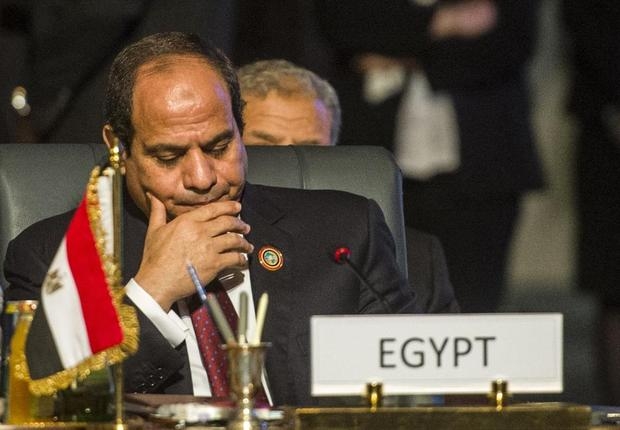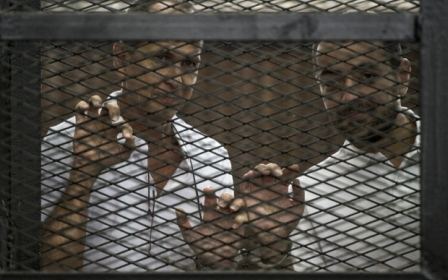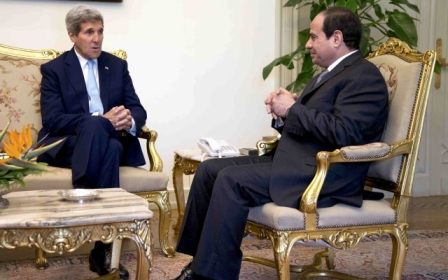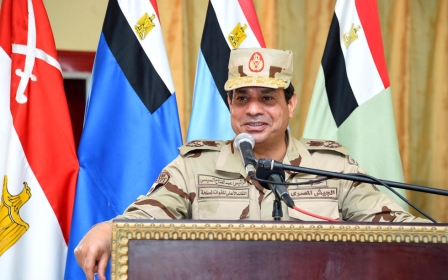In Egypt a house of (un)representatives?

Months before legislative election campaigns were legally scheduled to start last March, billboards brandishing the big patriotic smiles of parliamentary hopefuls flooded Egypt’s sprawling capital.
But in an unexpected turn of events, Egypt’s Supreme Constitutional Court (SCC) ruled that elements of two key electoral laws (the Boundary Delimitation Law delineating electoral districts, and the House of Representatives Law) were inconsistent with the 2014 Constitution. Ironically, the former head of the SCC Adly Mansour, then interim president, had personally ratified the three laws governing the House election, the two laws mentioned here as well as the Exercise of Political Rights Law.
Petitioners against the constitutionality of the Boundary Delimitation Law had argued that it violates the principle of fair, proportional representation of all voters. Indeed wide disparities in the size of the electoral districts had led to the SCC’s decision.
Earlier this month President Abdel Fattah al-Sisi gave his seal of approval to amended versions of these three laws and promised to have a functioning parliament before the end of 2015. At time of publication, the laws were still under review by the State Council and no dates have been set by the High Election Commission (HEC), only unofficial announcements to kick off the vote after the 6 August inauguration of a new lane that runs alongside the existing Suez Canal.
According to the new Boundary Delimitation Law, of the House’s 596 seats, 448 (75 percent) will be allocated to individual candidates and 120 seats (20 percent) to winner-takes-all lists with quotas for youth, women, Christians and workers, as opposed to 420 seats for individuals and 120 for lists in the previous version.
The law has also decreased constituencies from which non-party-affiliated independent candidates will be elected to 205 from 237, while maintaining four constituencies for party lists.
The president maintains his right to appoint 28 representatives, constituting five percent of the House.
Uproar over election changes
However, the changes were still met with roars of disapproval from stakeholders spanning the political and civil society spectrum, emphasising that the return to an individual seat majority of 75 percent will recreate the patronage system that had kept ousted president Mubarak’s National Democratic Party in power for 30 years, empowering the old networks that epitomised and entrenched corrupt state institutions.
In its Egyptian Parliamentary Election Interim Report released earlier this month, Democracy International warned that the political environment is not conducive to the emergence of a truly representative parliament.
“Unfortunately, the repression of political opposition has increased since the adoption of the constitution and the election of President Sisi,” said the report, pointing out that anti-terror legislation, placing debilitating restrictions on foreign funding, has been applied to punish peaceful NGOs and put pressure on dissenting voices.
“Repressive and selectively enforced laws,” the report continues, “such as laws governing demonstrations and the operations of civil society organisations, continue to chill the freedoms necessary for robust democratic participation and debate. There has been an increase in self-censorship by many stakeholders who seem careful to temper their criticism of the state, the government and its policies in order to minimise the risk of harassment or prosecution for expressing views that challenge the state’s policies or contradict its narrative.”
The political climate is indeed a nightmare version of the fateful 2010 elections, whose blatant rigging is said to have triggered the January 2011 uprising. In many ways, the situation today is much worse than it was five years ago when an invigorated civil society, youth groups such as April 6 and the “banned-but-tolerated” Muslim Brotherhood had some room to manoeuvre in the suffocating political space.
It will come as no surprise if the icons of the cronyism that inflamed anti-government sentiment in 2011 were to remerge as stars of the next elections.
Return to Mubarak-era politics
With the military’s removal of Muslim Brotherhood president Mohamed Morsi only one year into his term, and the systematic crackdown on the young activists who embodied the spirit of the 2011 uprising, Egypt will witness a literal return of Mubarak-era politics and politicians, this time marred by the Sisi sycophants who have polluted the airwaves for the past two years with their jingoistic hysteria against even the mildest criticism of the current regime.
In its escalating fight against terrorism that at times extended beyond borders, Egypt’s military-led regime is struggling to keep up appearances. Swearing in an elected parliament will help it reinforce an international legitimacy compromised by the lack of press freedom and what analysts see as a bloody crackdown on dissent under the guise of fighting terrorism.
Capitalising on a hyper-nationalist fervour whose goal is to unite Egyptians against an external threat, the local media machine complete with patriotic songs aired around the clock, continues to manufacture public consent at the expense of real change.
Eventually the elections will take place, if only to rubber-stamp Egypt’s strayed and turbulent political transition, but inevitably leading to the way things were not so long ago, especially in light of the fact that Sisi has been abusing his constitutional right to pass laws by executive decree in the absence of parliament over the past year.
According to the Tahrir Institute of Middle East Policy’s legislation tracker, under regular circumstances, Egypt’s constitution features several mechanisms to protect the deliberative process of legislation. Article 121 states that an absolute majority of the House of Representative members present is necessary to approve laws and sets forth an extensive means by which to propose legislation, guaranteeing that numerous voices are incorporated into the production of legislation and that the process is not dominated by one party.
Law by decree
Constitutionally, Sisi should have invoked his legislative authority in a limited way and only under exceptional circumstances. But this was not the case. The executive branch has issued well over 100 decrees to date, many of which are not urgent nor necessary to remedy emergency situations.
By December 2014, Interim President Mansour and Sisi after him had issued a slew of draconian laws and controversial decrees. Cases in point: The tender law, allows the government to award contracts to companies without a public tender process opening the doors wide to graft, nepotism and army projects; the extension of pre-trial detentions violates the basics of due process; the protest law, practically bans the right of association and the freedom to organise peaceful protests without the prior approval of an interior ministry known for shooting protesters; the investment law, bans third parties from appealing against the awarding of government contracts, hence corruption; the university law, gives the president the power to hire and fire university heads, strengthening the state’s stranglehold on campuses, historically an arena of violent confrontations with the regime.
Under the guise of combatting terrorism, decrees were passed to clampdown on foreign funding and military jurisdiction was expanded to include public spaces like roads, bridges and universities, which ultimately facilitates the trial of any political opposition in military courts. More recently, Sisi ratified the anti-terrorism law, sounding the death knell of civil liberties in Egypt and placing heavy restrictions on the media.
In a brazen move widely seen as targeting the outspoken head of the Central Auditing Authority’s Hisham Geneina, Sisi recently issued a law granting himself the right to depose the heads of four state financial and regulatory bodies - the Central Bank of Egypt (CBE), the Administrative Control Authority (ACA), the Central Auditing Authority (CAA) and the Egyptian Financial Supervisory Authority (EFSA) - under vaguely worded accusations such as “compromising national security” and “harming the public interest or other public figures”. However, articles 215 and 216 of the constitution stipulate that these officials can only be removed through conditions determined by law and gives them full financial and managerial independence.
According to the constitution, all laws adopted by the president are to be discussed and reviewed within 15 days of the enactment of a new parliament. Article 156 of the constitution technically notes that if parliament does not review the decrees in the first 15 days after commencing sessions, the executive decrees will not have the force of law.
But under the current political atmosphere how likely is it that anyone will cross the almighty president?
Practically, according to the Tahrir Institute, Egyptian parliaments have taken months to arrange their procedural by-laws, casting doubt on the next parliament’s logistical ability to review well over 100 decrees so soon after its birth. But even if by some miraculous feat the House is able to do so, it is improbable that the representatives will be of the calibre to engage in a head-on collision course with the deep state.
Since its inception, the Sisi mandate has sapped all elements of a full democratic process of meaning. The much-anticipated House of Representatives is no exception. Not only is its legitimacy compromised by a political environment anathema to inclusivity and open debate, dominated by fear, ignorance, bigotry and smear, but even before it convenes, it has already been hurled into a swamp of unconstitutional legislation that will take years to amend, considering that those who will be elected are remotely invested in the mirage called the public interest.
- Rania Al Malky is a Cairo-based columnist and former editor of Daily News Egypt (2006-2012).
The views expressed in this article belong to the author and do not necessarily reflect the editorial policy of Middle East Eye.
Photo: File photo shows Egyptian president Abdel Fattah al-Sisi (AFP)
New MEE newsletter: Jerusalem Dispatch
Sign up to get the latest insights and analysis on Israel-Palestine, alongside Turkey Unpacked and other MEE newsletters
Middle East Eye delivers independent and unrivalled coverage and analysis of the Middle East, North Africa and beyond. To learn more about republishing this content and the associated fees, please fill out this form. More about MEE can be found here.





